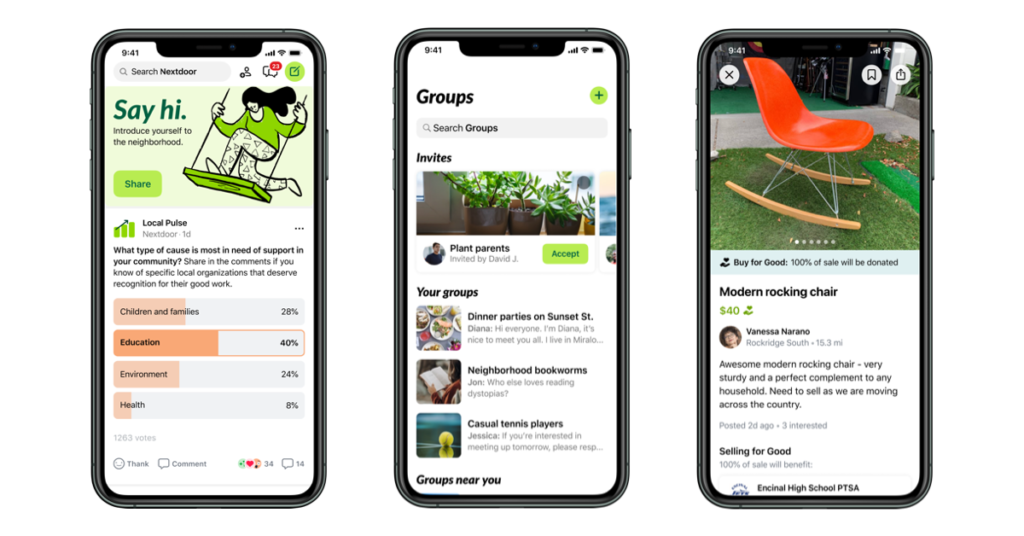

The company even recently unveiled a new features called Neighborhoods, which includes a profile that’s separate from the user’s main Facebook profile, and which allows them to meet people in their local community. The idea, as many have observed, is clearly a way of trying to steal some of the thunder of hyperlocal social network Nextdoor.
Despite this competition, though, Nextdoor is still thriving and growing, especially as the pandemic has forced so many people to stay local.
The company, which describes itself as the place “where communities come together to greet newcomers, exchange recommendations, and read the latest local news. Where neighbors support local businesses and get updates from public agencies. Where neighbors borrow tools and sell couches,” had 33 million Weekly Active Users in Q3 of this year, a 20% year-over-year increase.
The company also reported revenue of $52.7 million, a 66% increase, all of which came from advertising.
“To date, we have primarily attracted new neighbors through word-of-mouth, earned media, and through mailed invitations, and kept our content accessible only to Verified Neighbors. While we believe this approach was critical to develop our trusted platform, it also constrained our user growth relative to the total market opportunity. More recently, we have begun investing in new features to inspire neighbors to increase engagement, such as the ability to follow multiple neighborhoods, join interest groups, and make moments more engaging and shareable with enhanced video capabilities,” the company wrote in a filing the SEC.
“We took a similarly deliberate approach to our monetization efforts. We serve customers who consist of large brands and small and mid-sized businesses seeking to provide hyperlocal, engaging advertising content to our large and engaged base of neighbors.”
The company deploys a number of different types of advertising products, including Neighborhood Sponsorships, which was it’s first product, launched in 2017; they were initially used by real estate agents to create automated ad placements to post to the Nextdoor Newsfeed.
“Small businesses leverage Neighborhood Sponsorships to drive awareness, build a positive reputation, and keep their business top of mind. With these sponsorships they create and distribute automated ad placements that regularly post to the newsfeed in targeted ZIP codes,” Nextdoor explained in its filing.
Other ad products include Local Deals, which allows businesses and users to design discounts and promotions for specific neighborhoods, as well as Sponsored Posts, which can be placed in a number of different places on the Nextdoor app, including the Newsfeed and the In-App Digest, which is a summary of the updates from the user’s Nextdoor neighborhood. These ads can also be customized with neighborhood name and store location.
Sponsored Posts can also be placed in the Finds section of the app, which is a local marketplace where neighbors buy, sell, or give away items.
“Large brands can leverage Sponsored Posts in Finds to drive action such as shop now. Our local marketplace is where neighbors with high intent to buy will go. Ads are given a top spot in this contextually relevant space with the opportunity to customize by neighborhood,” wrote Nextdoor.
In 2020, the company saw $123.3 million in revenue, a 49% increase from $82.6 million in 2019.
Nextdoor went public via a SPAC merger in November, which valued the company at $4.3 billion. Prior to that, it had raised $717.9 million in venture funding.

















